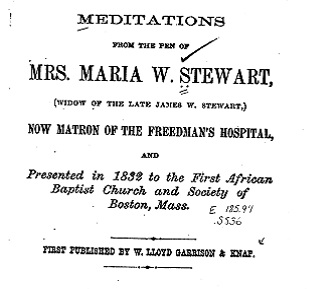
Maria W. Stewart
Maria W. Stewart was the earliest known American woman to lecture in public on political issues. She was a teacher, journalist, and lecturer known for her roles in the anti-slavery and women’s rights movements.
Born free in Connecticut, but orphaned at an early age and bound out to a clergyman’s family, Stewart became part of Boston’s free Black community in the 1820s. In 1831, William Lloyd Garrison published her pamphlet “Religion And The Pure Principles of Morality: The Sure Foundation On Which We Must Build” in The Liberator. In the text, she espoused racial uplift and for Black women to “Possess the spirit of men, bold and enterprising, fearless and undaunted. Sue for your rights and privileges. . . .” In 1832, Stewart began lecturing in Boston, at a time when it was culturally prohibited for women to speak at political gatherings–especially those that included both men and women.
Between 1832 and 1833, Stewart gave four speeches: the first to the women of the African American Intelligence Society and the remainder to mixed audiences of men and women, Blacks and whites, in major venues throughout the city. Her gender and her messages, delivered with religious zeal, about racism, colonization, higher education for women, and the inadequacy of Black male leadership drew withering criticism. In 1833, Stewart delivered her “Farewell Address . . .” and left Boston to become a teacher in New York, Baltimore, and finally Washington, D.C., where she became the Matron of Freedmen’s Hospital, later Howard University Hospital. In 1879, Stewart published Meditations from the Pen of Mrs. Maria W. Stewart, a revised edition of her 1835 work.
There are no known photos of Maria Stewart. This is the front page of her Meditations book:
